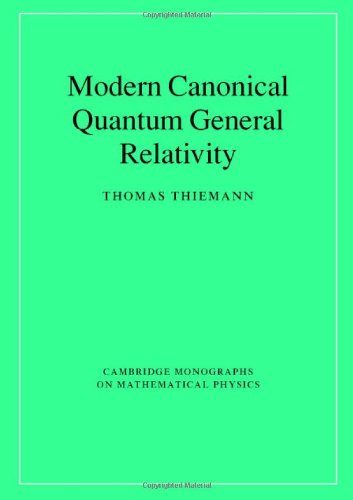
Introduction to Modern Canonical Quantum General Relativity
by Thomas Thiemann
Publisher: arXiv 2001
ISBN/ASIN: 0521842638
Number of pages: 303
Description:
This is an introduction to the research field of canonical quantum general relativity, sometimes called "loop quantum gravity". Canonical quantum general relativity is an attempt to define a mathematically rigorous, non-perturbative, background independent theory of Lorentzian quantum gravity in four spacetime dimensions in the continuum.
Download or read it online for free here:
Download link
(2.7MB, PDF)
Similar books
 Quantum Physics, Relativity, and Complex Spacetime
Quantum Physics, Relativity, and Complex Spacetimeby Gerald Kaiser - University of Massachusetts at Lowell
A new synthesis of the principles of quantum mechanics and Relativity is proposed in the context of complex differential geometry. The positivity of the energy implies that wave functions and fields can be extended to complex spacetime.
(14551 views)
 Canonical Transformations in Quantum Mechanics
Canonical Transformations in Quantum Mechanicsby Arlen Anderson - arXiv
Quantum canonical transformations are defined algebraically. This generalizes the quantum canonical transformations to include non-unitary transformations. Their importance for constructing solutions of the Schroedinger equation is discussed.
(9405 views)
 The Spin Foam Approach to Quantum Gravity
The Spin Foam Approach to Quantum Gravityby Alejandro Perez - arXiv
This article reviews the present status of the spin foam approach to the quantization of gravity. Special attention is payed to the pedagogical presentation of the recently introduced new models for four dimensional quantum gravity.
(7550 views)
 An Elementary Introduction to Loop Quantum Gravity
An Elementary Introduction to Loop Quantum Gravityby Norbert Bodendorfer - arXiv
An introduction to loop quantum gravity is given, focussing on the fundamental aspects of the theory, different approaches to the dynamics, as well as possible future directions. It is structured in five lectures, including exercises.
(6543 views)